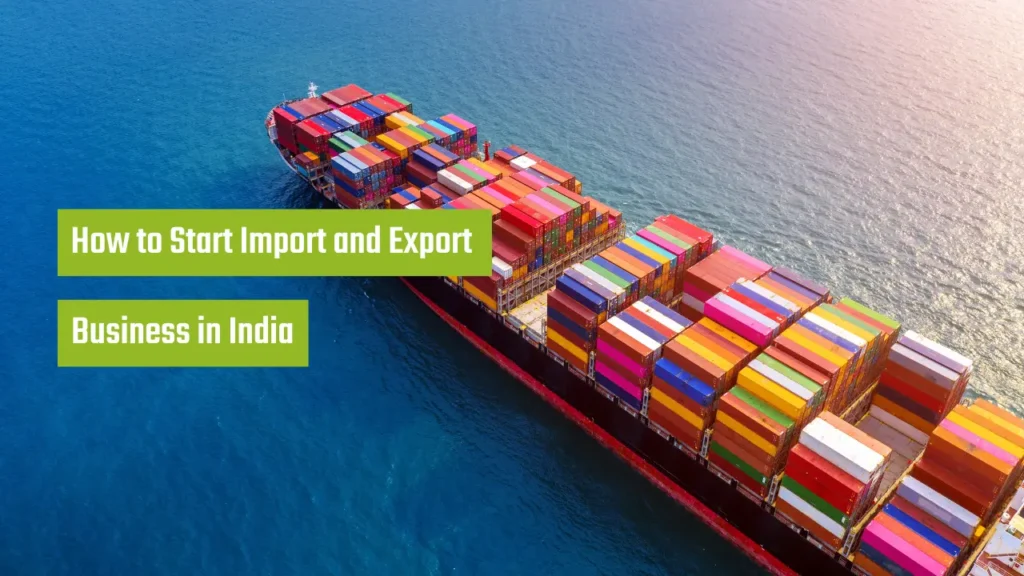Table of Contents
ToggleHow to Start Import and Export Business in India
Starting an import and export business in India can be a lucrative and exciting opportunity for entrepreneurs looking to expand their horizons. With a vast and diverse population, a growing economy, and a strategic location, India offers a wealth of opportunities for businesses looking to import and export goods and services. In this blog, we will take a comprehensive look at the steps involved in starting an import and export business in India.
Step 1: Conduct Market Research
Before starting any business, it is essential to conduct thorough market research. This research will help you determine the viability of your business idea, identify potential competitors, and understand the demand for the products or services you plan to import or export.
When conducting market research for an import and export business, it is important to consider factors such as the cultural and economic environment, trade regulations, and the target market for your products or services.
Looking for a financial expert who can help you with his best advice and experience? Click here to speak to one of our financial experts.
Step 2: Choose a Business Structure
Once you have conducted your market research, the next step is to choose a business structure. In India, the most common business structures for import and export businesses are sole proprietorship, partnership, limited liability company (LLC), or private limited company (PLC).
Each of these structures has its own set of benefits and drawbacks, so it is important to consider your personal and business goals when choosing the right structure for your import and export business.
People from Maharashtra who also read for Starting an Import and Export Business in India: A Step-by-Step Guide
Step 3: Register Your Business
Once you have chosen your business structure, the next step is to register your business. In India, you can register your import and export business with the Registrar of Companies (ROC), which is part of the Ministry of Corporate Affairs. The process of registering your business can be completed online and usually takes around 10-15 days.
Step 4: Obtain the Required Licenses and Permits
In addition to registering your business, it is also necessary to obtain the required licenses and permits to import and export goods and services. In India, some of the most common licenses and permits required for import and export businesses include an Importer Exporter Code (IEC) number, Foreign Trade Policy (FTP) Registration, and a PAN (Permanent Account Number) card.
Step 5: Choose Your Products or Services
Choosing the right products or services to import or export is a critical step in starting your import and export business. When selecting products or services, it is important to consider factors such as demand, competition, and profitability. Additionally, it is important to research the trade regulations and tariffs that apply to the products or services you plan to import or export.
Step 6: Establish Relationships with Suppliers and Customers
Once you have selected your products or services, the next step is to establish relationships with suppliers and customers. Building strong relationships with suppliers and customers is essential for the success of your import and export business. When establishing these relationships, it is important to consider factors such as quality, reliability, and cost.
Step 7: Develop a Marketing Plan
Developing a comprehensive marketing plan is another critical step in starting your import and export business. Your marketing plan should include a detailed analysis of your target market, a description of your products or services, and a clear strategy for reaching your customers.
In addition to traditional marketing methods, such as advertising and promotions, it is also important to consider digital marketing methods, such as social media and search engine optimization (SEO), to reach a wider audience.
Step 8: Secure Financing
Finally, securing financing is an essential step in starting your import and export business. In India, there are several sources of financing available to businesses, including bank loans, government grants, and venture capital. When securing financing, it is important to consider your business goals.
Eligibility Criteria
- To be eligible, an individual must be between the ages of 21 and 65.
- The lender will assess the company’s history, revenue, and professional background.
- A positive credit score and track record of timely debt repayment are also considered.
- It is essential to have no prior history of defaulting on a loan with a financial institution.
People from Mumbai who also read for Types of Loans Available for Starting an Import Export Business
Types of Loans Available for Starting an Import Export Business
There are several loans available for individuals looking to start an import and export business in India. Some of the most common loan options include:
- Bank Loans: Banks in India offer a variety of loans for small and medium-sized businesses, including import and export businesses. Bank loans can provide a significant amount of financing but often come with strict requirements and long approval processes.
- Government Loans: The Indian government offers several loans and financial assistance programs for small and medium-sized businesses, including import and export businesses. These loans are often easier to obtain and have more flexible terms, but may come with restrictions on how the funds can be used.
- Venture Capital: Venture capital firms provide funding for start-up businesses with high growth potential. While venture capital can be difficult to obtain, it can provide a significant amount of financing for businesses that meet their criteria.
- Angel Investors: Angel investors are individuals who provide funding for start-up businesses in exchange for equity. Angel investors are often easier to obtain than venture capital, but the terms of the investment can vary widely.
- Microfinance: Microfinance institutions provide small loans to individuals and small businesses, including import and export businesses. Microfinance loans are often easier to obtain than other types of financing and can provide the funds needed to get started.
Need a collateral-free loan to start a new business? Click here for further details.
It is important to carefully consider your financing options and to understand the terms and requirements of each loan before choosing the right one for your import and export business.






